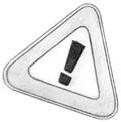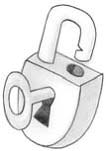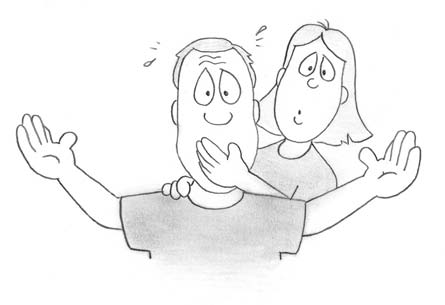The 1-2-3 Magic Workbook for Christian Parents: Effective Discipline for Children 2-12 (4 page)
Read The 1-2-3 Magic Workbook for Christian Parents: Effective Discipline for Children 2-12 Online
Authors: Thomas W. Phelan,Chris Webb
Tags: #Family & Relationships, #Parenting, #General

STOP BEHAVIOR AND START BEHAVIOR 13
When managing a behavioral difficulty with one of your children,
therefore, you will need to first determine if you have a Stop or a Start
behavior problem. Is the issue something I want the child to quit? Or is it
something I want the youngster to get going on? Since counting is so easy,
one of the biggest problems we run into is parents using counting for Start
behavior; for example, counting a child to get her to do her homework. As
you will soon see, counting produces motivation that usually lasts only
a short time (from a few seconds to a couple of minutes) in children. If
you mix up your tactics (e.g., use counting for homework), you will not
get optimum results.
But don’t worry. This whole procedure is so simple, you’ll be an
expert in no time. Effective discipline will start to come naturally and—
believe it or not—your kids will start listening to you. But first, you must
learn to think realistically—and not wishfully—about your kids. You may
have a dangerous false assumption floating around in your head about
young children.
Important Reminder
For
Stop behavior
, such as:
For
Start behavior
, such as:
Whining
Picking up
Teasing
Eating
Arguing
Homework
Pouting
Bedtime
Yelling
Up and out
Tantrums
Etc.
Use Praise, Simple Requests,
Kitchen Timers, The Docking
Use the 1-2-3, or “counting”
System, Natural Consequences,
procedure.
Charting or the 1-2-3 Variation.

3
The Little Adult Assumption
Kids are just kids!
Many parents and teachers carry around in their heads a trouble-
producing notion about young children. This idea is a kind of false
assumption or wish that causes discipline attempts that don’t work, along
with stormy scenes that make everyone feel bad. This erroneous concept
is known as the “Little Adult Assumption.”
The Little Adult Assumption is the belief that kids have hearts of
gold and that they are basically reasonable and unselfish. They’re just
smaller versions of grownups, in other words. And because they are little
adults, this notion goes, whenever the youngsters are misbehaving or not
cooperating, the problem must be that they don’t have enough information
at their disposal to be able to do the right thing.
Imagine, for example, that your eight-year-old son is torturing his
little sister for the fifteenth time since they got home from school. What
should you do? If your boy is a little adult, you simply sit him down,
calmly look him in the eye, and explain to him the three golden reasons
why he shouldn’t tease his sister. First of all, teasing hurts her. Second, it
makes you mad at him. Third—and most important—how would he feel
if someone treated him like that?
15
16 1-2-3 MAGIC
Your son looks at you, his face brightening with insight, and he says,
“Gee, I never looked at it like that before!” Then he stops bothering his
sister for the rest of his life. That would certainly be nice, but any veteran
parent or teacher knows that scenes like that don’t happen. Kids are not
little adults.
The crucial point here is this: Grownups who believe—or want to
believe—the Little Adult Assumption are going to rely heavily on
words
and reasons
in dealing with young kids and trying to change their be-
havior. And words and reasons, by themselves, are going to be miserable
failures much of the time. Sometimes explanations will have absolutely
no impact at all. Other times explanations will take the parent and child
through what we call the
Talk-Persuade-Argue-Yell-Hit Syndrome.
What is that? Imagine your child is doing something you don’t like.
You read in a parenting book that you should talk the problem out no matter
how long it takes. So you try telling your daughter why she shouldn’t be
doing what she’s doing. She doesn’t respond, so you next try to persuade
her to see things your way. When persuasion fails, you start arguing with
the little girl. Arguing leads to a yelling match, and when that fails, you
may feel there is nothing left to do but hit. Actually, ninety-nine percent
of the time that parents scream, hit and spank their children, the parent
is simply having a temper tantrum. The tantrum is a sign that (1) the
parent doesn’t know what to do, (2) the parent is so frustrated that he or she
can’t see straight, and (3) this adult has an anger management problem.
We’re not implying that you are going around hitting your kids all the
time. It may be true, however, that the chief cause of child abuse (physi-
cal abuse, not sexual) is the Little Adult Assumption. A parent reads in a
book that talking and reasoning is the preferred method. When talking and
reasoning fail, however, the parent goes crazy and starts hitting, because
his favorite strategy isn’t working and desperation has set in.
As we’ll clarify more later, talking and explaining certainly have
their place in raising children. But kids are just kids—not little adults.
Years ago one writer said, “Childhood is a period of transitory psychosis.”
She meant that kids, when they are little, are—in a way—sort of nuts!
They are not born reasonable and unselfish, they are born unreasonable
and selfish. Consequently, it is the parent’s job—and the teacher’s job—to

THE LITTLE ADULT ASSUMPTION 17
help kids become the opposite. In accomplishing this goal adults need to
be gentle, consistent, decisive and calm.
How do you do that? You start by changing your thinking about
children and by getting rid of the Little Adult Assumption. In order to
get this erroneous notion out of parents’ heads, we use a bit of what we
call “cognitive shock.” Although it’s a little exaggerated and may sound
strange, think of it like this: Instead of imagining your kids as little adults,
think of yourself as a
wild animal trainer
! We
don’t mean, of course, using whips, guns or chairs.
CAUTION
And we certainly don’t mean being nasty.
One explanation, if really
But what does a wild animal trainer do? He necessary, is fine.
chooses a method—which is largely nonverbal— It’s the attempts at
and repeats it until the “trainee” does what he, the
repeated explanations
that get adults and kids
trainer, wants. The trainer is patient and gentle, into trouble. Too much
but also persistent. Our job in
1-2-3 Magic
is to parent talking irritates and
present some useful training methods to you, so distracts children.
that you can repeat them until the trainees, your
children, do what you want them to. Fortunately, you do not usually have
to repeat these methods for very long before you get results. And you
can gradually add more talking and reasoning as the kids get older. But
remember this: One explanation—if necessary—is fine. It’s the attempts
at repeated explanations that get adults and children in trouble.
Dictatorship to Democracy
The overall orientation of
1-2-3 Magic
is what you might call “dictatorship
to democracy.” When your kids are lit le, your house should be pret y much
a benign dictatorship where you are the judge and jury. Your two-year-old,
for example, cannot decide to go out and play in the street, no matter how
much he wants to. And your four-year-old cannot arbitrarily opt—at 7:30
in the morning on Wednesday—to skip preschool because she wants to
stay home and play with the new toy she just got for her birthday.
When the kids are in their mid to late teens, though, your house
should be more of a democracy. The youngsters should have more to say
about the rules and policies that affect them. You should be having family
meetings from time to time to iron out differences (Chapter 19). Even

18 1-2-3 MAGIC
when the kids are teens, though, when push comes to shove, who’s paying
the mortgage? You are. And who knows better than the kids do what’s
good for them? You do. And, when necessary, you have a right—and a
duty—to impose limits on your children, even if they don’t like it.
Too many parents these days are afraid of their children. What are
they afraid of? Physical attack? Not usually. What many parents fear
is that their children won’t like them. So, in a conflict situation, these
parents explain and explain and explain, hoping the child will eventu-
ally come around. All too often, these parental efforts simply lead to the
Talk-Persuade-Argue-Yell or Talk-Persuade-Argue-Yell-Hit Syndrome.
What if you have children who always respond to words and reasons?
You are certainly lucky! Recent research has indicated that there are three
such children in this country. If you have one or more of them, you may
not need this book. Or, if your kids ever stop responding to logic, you
can consider using the 1-2-3.
So what is this training method we’re talking about? We first have
to explain what it is not.
Key Concepts...
Noncompliance and lack of cooperation in children are not
always due to lack of information. Kids are not little adults
or simply small computers, so raising youngsters involves
training as well as explaining.

4
The Two Biggest
Discipline Mistakes
Silence often speaks louder than words.